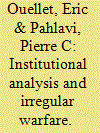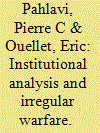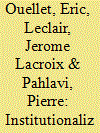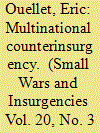| Srl | Item |
| 1 |
ID:
108710


|
|
|
|
|
| Publication |
2011.
|
| Summary/Abstract |
This article proposes a case study to illustrate the usefulness of sociological institutional analysis as a method to uncover 'blue force' challenges to deal with irregular warfare. The French Army's adaptation to revolutionary warfare in Algeria, starting in 1954, is used to illustrate both the application of the methodology and how institutional forces can hinder as well as overwhelm transformation for irregular warfare. The analysis emphasizes three key dimensions of the French Army's institutional adaptation: the regulative, normative and cognitive. These empirical elements are used to show how they interacted and influenced the institutional implementation of the French COIN structures.
|
|
|
|
|
|
|
|
|
|
|
|
|
|
|
|
| 2 |
ID:
109952


|
|
|
|
|
| Publication |
2012.
|
| Summary/Abstract |
The new attention paid to 'small wars' does not seem to translate into a better adaptation of conventional armed forces to this type of conflicts. As illustrated by the IDF's inability to get a decisive edge against the Hezbollah during the 33-Day War, Israel is no exception to such difficulty to adapt. A number of analysts have concluded that, victim of its long experience gained through the Intifadas, Israel 'over-adapted' to irregular warfare. Applying a sociological framework inspired by the seminal work of Richard Scott, this study suggests that this view is, at best, arguable. Going beyond the classical military explanations by uncovering key sociopolitical forces that have shaped the Israeli defense institutions, this study proposes that the combination of a post-heroic society and unbalanced civil-military relations have led the Israeli military institution to opt for a conventional posture articulated around technocentric tenets, which are ultimately disregarding the true nature of the asymmetrical challenge presented by the Hezbollah.
|
|
|
|
|
|
|
|
|
|
|
|
|
|
|
|
| 3 |
ID:
108606


|
|
|
| 4 |
ID:
133542


|
|
|
|
|
| Publication |
2014.
|
| Summary/Abstract |
A number of observers have expressed serious concerns that Al-Qaeda in the Islamic Maghreb (AQMI), as it expands in the Sahel, may become strong enough to be a threat to Europe and carry on the global mission of Al-Qaeda as conceived by bin Laden. This fear seems unwarranted. Using institutional analysis to study the AQMI behavioral fluctuations over the last decade, this article argues that AQMI's need to find a compromise between external and internal legitimacy has constrained its behavior. The affiliation of the Algerian terrorists with Al-Qaeda was in many ways a marriage of convenience that created a number of internal contradictions. At the cognitive level, implicit Algerian nationalism to rid the country of its corrupt regime remains at odds with pan-Islamic views shared by Al-Qaeda's leadership. At the normative level, indiscriminate suicide bombing supported by Al-Qaeda is abhorrent to many Algerian terrorists, who construe their mandate in the spirit of the Algerian war of independence where it is their duty to protect civilians. These and other contradictions prevent AQMI from developing a coherent political agenda and thus it is less likely to engage in a long-term conflict against European societies.
|
|
|
|
|
|
|
|
|
|
|
|
|
|
|
|
| 5 |
ID:
092307


|
|
|
|
|
| Publication |
2009.
|
| Summary/Abstract |
This article proposes a case study of the multinational counterinsurgency operations that occurred in China during the Boxer Rebellion in 1900-1, to provide a better understanding of the political and military dynamics specific to this type of mission. The study focuses primarily on the nature of the cooperation on the ground, the various national approaches to counterinsurgency, and the asymmetry of strategic approach between the Westerners and the Chinese. A discussion is also proposed, highlighting that combined counterinsurgency is not per se an obstacle to the unity of command, but that politically international coalitions create unique challenges to counterinsurgency operations.
* Views and opinions expressed in this text are those of the author and do not represent, or otherwise reflect, any official opinion or position of the Department of National Defence or the Government of Canada. Reproduced with permission of the Department of National Defence, Government of Canada.
|
|
|
|
|
|
|
|
|
|
|
|
|
|
|
|